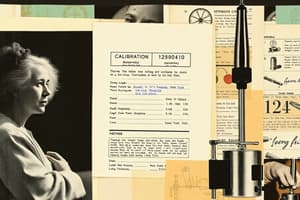Podcast
Questions and Answers
Why is regular maintenance and calibration important for laboratory equipment?
Why is regular maintenance and calibration important for laboratory equipment?
- To speed up experimental processes
- To increase the risk of work accidents
- To decrease the cost of initial equipment purchase
- To ensure equipment remains efficient and provides accurate results (correct)
What is a key benefit of maintaining and calibrating lab equipment?
What is a key benefit of maintaining and calibrating lab equipment?
- Increasing the risk of work accidents
- Extending equipment life span (correct)
- Reducing standardization
- Decreasing accuracy in measurements
Why does calibration play a crucial role in laboratory measurements?
Why does calibration play a crucial role in laboratory measurements?
- To prevent any cost savings
- To make measurements less accurate
- To increase the risk of work accidents
- To ensure dependability and precision (correct)
How does calibration contribute to improved safety in laboratories?
How does calibration contribute to improved safety in laboratories?
Which factor contributes to efficient lab operations based on the text?
Which factor contributes to efficient lab operations based on the text?
Which classification system divides laboratory equipment into mechanical, electrical, and environmental categories?
Which classification system divides laboratory equipment into mechanical, electrical, and environmental categories?
Which of the following is an example of electrical laboratory equipment?
Which of the following is an example of electrical laboratory equipment?
What is the primary purpose of maintenance and calibration of laboratory equipment?
What is the primary purpose of maintenance and calibration of laboratory equipment?
Which type of laboratory equipment is used exclusively for scientific research?
Which type of laboratory equipment is used exclusively for scientific research?
Why do different categories of laboratory equipment require distinct calibration techniques?
Why do different categories of laboratory equipment require distinct calibration techniques?
Flashcards are hidden until you start studying
Study Notes
Laboratory Equipment: Classification, Importance, and Maintenance
Laboratory equipment plays a vital role in various industries, including healthcare, pharmaceuticals, and research facilities. Ensuring the accuracy and reliability of laboratory equipment is crucial for obtaining dependable and reproducible results. Three primary classifications exist for laboratory equipment: classification based on functions, applications, and importance of maintenance and calibration.
Function-Based Classification
Function-based classification divides laboratory equipment into mechanical, electrical, and environmental categories. Here are some examples of the equipment included in each category:
- Mechanical: Balances, clamps, torque wrenches, microscopes, burettes, pipettes, and centrifuges.
- Electrical: Oscilloscopes, multimeters, power supplies, digital voltmeters, spectrum analyzers, and signal generators.
- Environmental: Refrigerators, freezers, incubators, water baths, autoclaves, and ovens.
Each category requires distinct calibration techniques and schedules depending on the nature of the equipment and its intended usage.
Application-Based Classification
Application-based classification categorizes laboratory equipment based on their usage. Some examples include:
- Research equipment: Spectrometers, chromatographs, microscopes, and other specialized instruments used exclusively for scientific research.
- Medical equipment: Diagnostic devices like blood analyzers and imaging systems used in healthcare facilities.
- Pharmaceutical equipment: Drug manufacturing machines like capsule fillers, tableting presses, and lyophilizers.
Importance of Maintenance and Calibration
Regular maintenance and calibration ensure that laboratory equipment remains efficient and provides accurate results. Key benefits of maintaining and calibrating lab equipment include:
Maintain Accuracy
Calibration helps maintain the accuracy of measurements by adjusting instruments to standardized benchmarks. This ensures reliable results during experiments and testing processes.
Extend Equipment Life Span
Well-maintained equipment lasts longer and experiences fewer breakdowns, reducing replacement costs and downtime.
Reduce Hazards
By minimizing measurement errors, the risk of work accidents caused by incorrect readings is significantly reduced.
Importance of Calibration
Calibration plays a crucial role in ensuring the dependability and precision of laboratory measurements. Key reasons why calibration is essential include:
Cost Savings
Calibration reduces costs associated with equipment failure and wasted resources.
Improved Safety
Reliable measurements prevent dangerous situations arising from misinterpretation of experimental results.
Compliance with Regulations
Certification often requires proper calibration procedures to maintain quality control and regulatory compliance.
Enhances Research Integrity
Accurately maintained and calibrated equipment provides trustworthy results that contribute to the advancement of scientific research.
In conclusion, understanding the classification of laboratory equipment based on function and application, maintaining accuracy through regular calibration, extending equipment life span by preserving functionality, reducing hazards arising from inaccurate measurements, and adhering to regulatory guidelines are all significant factors that contribute to efficient lab operations.
Studying That Suits You
Use AI to generate personalized quizzes and flashcards to suit your learning preferences.




